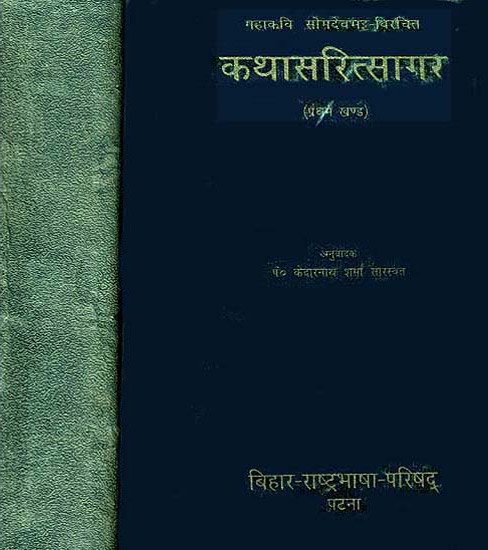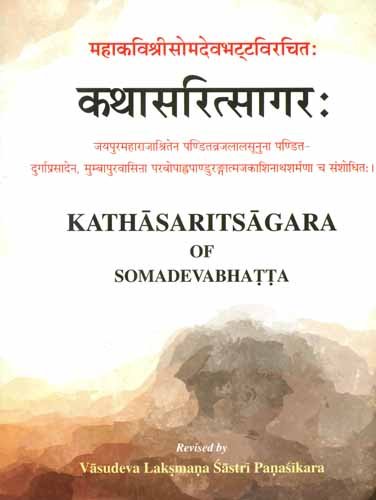Kathasaritsagara [sanskrit]
by C. H. Tawney | 2014 | 226,424 words | ISBN-13: 9789350501351
The Sanskrit edition of the Kathasaritsagara referencing the English translation and grammatical analysis. Written by Somadeva and dating from the 12th century, the Kathasaritsagara (or Katha-sarit-sagara) represents an epic legend narrating the adventures of Naravahanadatta as he strives to become the destined emperor of the Vidyadharas. Alternative titles: (Kathāsaritsāgara, कथासरित्सागर, Kathā-sarit-sāgara)
Verse 12.33.57
ततः स सकलान्समं सपदि मन्त्रिणः प्राप्य तान् दृशाकुलितया गिरा प्रमदमन्थरारम्भया ।
नरेश्वरसुतो ऽधिकप्रणयम् एकम् एकं मुहुर् ददर्श परिषस्वजे तद् अनु संबभाषे कृती ॥ ५७ ॥
tataḥ sa sakalānsamaṃ sapadi mantriṇaḥ prāpya tān dṛśākulitayā girā pramadamantharārambhayā |
nareśvarasuto 'dhikapraṇayam ekam ekaṃ muhur dadarśa pariṣasvaje tad anu saṃbabhāṣe kṛtī || 57 ||
The English translation of Kathasaritsagara Verse 12.33.57 is contained in the book The Ocean of Story by C.H. Tawney. This book is available online or you could buy the latest edition:
Read online Buy now! The English translation by C.H. Tawney (2014)
Glossary of Sanskrit terms
Note: This extracts Sanskrit terms and links to English definitions from the glossary, based on an experimental segmentation of verse (12.33.57). Some terms could be superfluous while some might not be mentioned. Click on the word to show English definitions.
Tatah, Tad, Tata, Sakala, Samam, Sama, Sapadi, Mantrin, Mantri, Prapya, Drisha, Drish, Akulita, Gir, Gira, Pramada, Manthara, Arambha, Nareshvara, Sut, Suta, Adhika, Pranaya, Eka, Muhur, Pari, Sha, Svaja, Tat, Anu, Samba, Bhasha, Krit, Kriti, Kritin,
Analysis of Sanskrit grammar
Note: this is an experimental feature and only shows the first possible analysis of the Sanskrit text (Kathasaritsagara Verse 12.33.57). If the system was successful in segmenting the sentence, you will see of which words it is made up of, generally consisting of Nouns, Pronouns, Verbs, Participles and Indeclinables. Click on the link to show all possible derivations of the word.
- Line 1: “tataḥ sa sakalānsamaṃ sapadi mantriṇaḥ prāpya tān dṛśākulitayā girā pramadamantharārambhayā ”
- tataḥ -
-
tataḥ (indeclinable adverb)[indeclinable adverb]tataḥ (indeclinable correlative)[indeclinable correlative]tataḥ (indeclinable)[indeclinable]tad (noun, neuter)[ablative single], [ablative dual], [ablative plural]tata (noun, masculine)[nominative single]√tan -> tata (participle, masculine)[nominative single from √tan class 8 verb]sa (noun, masculine)[ablative single], [ablative dual], [ablative plural]sā (noun, feminine)[ablative single], [ablative dual], [ablative plural]
- sa -
-
sa (noun, neuter)[compound], [vocative single]sa (noun, masculine)[nominative single]
- sakalān -
-
sakala (noun, masculine)[accusative plural]
- samam -
-
samam (indeclinable)[indeclinable]sama (noun, masculine)[adverb], [accusative single]sama (noun, neuter)[adverb], [nominative single], [accusative single]samā (noun, feminine)[adverb]
- sapadi -
-
sapadi (indeclinable)[indeclinable]
- mantriṇaḥ -
-
mantrin (noun, masculine)[nominative plural], [vocative plural], [accusative plural], [ablative single], [genitive single]mantrin (noun, neuter)[ablative single], [genitive single]mantrī (noun, neuter)[ablative single], [genitive single]
- prāpya -
-
prāpya (noun, masculine)[compound], [vocative single]prāpya (noun, neuter)[compound], [vocative single]
- tān -
-
ta (noun, masculine)[accusative plural]sa (noun, masculine)[accusative plural]
- dṛśā -
-
dṛśa (noun, masculine)[compound], [vocative single]dṛśā (noun, feminine)[nominative single]dṛś (noun, feminine)[instrumental single]dṛś (noun, masculine)[instrumental single]
- ākulitayā -
-
ākulitā (noun, feminine)[instrumental single]
- girā -
-
gir (noun, feminine)[instrumental single]gir (noun, masculine)[instrumental single]gir (noun, neuter)[instrumental single]girā (noun, feminine)[nominative single]
- pramada -
-
pramada (noun, masculine)[compound], [vocative single]pramada (noun, neuter)[compound], [vocative single]
- mantharā -
-
manthara (noun, masculine)[compound], [vocative single]manthara (noun, neuter)[compound], [vocative single]mantharā (noun, feminine)[nominative single]
- ārambhayā -
-
ārambhā (noun, feminine)[instrumental single]
- Line 2: “nareśvarasuto 'dhikapraṇayam ekam ekaṃ muhur dadarśa pariṣasvaje tad anu saṃbabhāṣe kṛtī ”
- nareśvara -
-
nareśvara (noun, masculine)[compound], [vocative single]
- suto' -
-
sut (noun, masculine)[nominative plural], [vocative plural], [accusative plural], [ablative single], [genitive single]sut (noun, neuter)[ablative single], [genitive single]suta (noun, masculine)[nominative single]√su -> suta (participle, masculine)[nominative single from √su class 5 verb]√sū -> suta (participle, masculine)[nominative single from √sū class 6 verb]√sū -> suta (participle, masculine)[nominative single from √sū class 2 verb]√su (verb class 2)[present active third dual]
- adhika -
-
adhika (noun, masculine)[compound], [vocative single]adhika (noun, neuter)[compound], [vocative single]
- praṇayam -
-
praṇaya (noun, masculine)[adverb], [accusative single]
- ekam -
-
eka (noun, masculine)[accusative single]eka (noun, neuter)[nominative single], [accusative single]
- ekam -
-
eka (noun, masculine)[accusative single]eka (noun, neuter)[nominative single], [accusative single]
- muhur -
-
muhur (indeclinable adverb)[indeclinable adverb]muhur (indeclinable)[indeclinable]
- dadarśa -
-
√dṛś (verb class 1)[perfect active first single], [perfect active third single]
- pari -
-
pari (indeclinable adverb)[indeclinable adverb]pari (indeclinable)[indeclinable]pari (noun, masculine)[compound], [adverb]pari (noun, feminine)[compound], [adverb]pari (noun, neuter)[compound], [adverb], [nominative single], [vocative single], [accusative single]parī (noun, masculine)[adverb]parī (noun, feminine)[compound], [adverb], [vocative single]parī (noun, neuter)[compound], [adverb], [nominative single], [vocative single], [accusative single]
- ṣa -
-
ṣa (noun, masculine)[compound], [vocative single]ṣa (noun, neuter)[compound], [vocative single]
- svaje -
-
svaja (noun, masculine)[locative single]svaja (noun, neuter)[nominative dual], [vocative dual], [accusative dual], [locative single]svajā (noun, feminine)[nominative dual], [vocative single], [vocative dual], [accusative dual]√svaj (verb class 1)[present middle first single]√svañj (verb class 1)[present middle first single]
- tad -
-
tad (indeclinable)[indeclinable]tad (indeclinable adverb)[indeclinable adverb]tat (indeclinable correlative)[indeclinable correlative]tad (noun, neuter)[compound], [nominative single], [accusative single]
- anu -
-
anu (indeclinable adverb)[indeclinable adverb]anu (indeclinable preposition)[indeclinable preposition]anu (noun, masculine)[compound], [adverb]anu (noun, neuter)[compound], [adverb], [nominative single], [vocative single], [accusative single]anu (noun, feminine)[compound], [adverb]
- samba -
-
samba (noun, masculine)[compound], [vocative single]samba (noun, neuter)[compound], [vocative single]
- bhāṣe -
-
bhāṣā (noun, feminine)[nominative dual], [vocative single], [vocative dual], [accusative dual]bhāṣa (noun, masculine)[locative single]bhāṣa (noun, neuter)[nominative dual], [vocative dual], [accusative dual], [locative single]√bhāṣ (verb class 1)[present middle first single]
- kṛtī -
-
kṛtī (noun, masculine)[compound]kṛtī (noun, feminine)[compound], [nominative single]kṛt (noun, neuter)[nominative dual], [vocative dual], [accusative dual]kṛti (noun, feminine)[nominative dual], [vocative dual], [accusative dual]kṛti (noun, masculine)[nominative dual], [vocative dual], [accusative dual]kṛtin (noun, masculine)[nominative single]
Other editions:
Also see the following editions of the Sanskrit text or (alternative) English translations of the Kathasaritsagara Verse 12.33.57
Kathasaritsagar
by Kedarnath Sharma Saraswat (2005)
The Only Edition with the Sanskrit Text and its Hindi Translation (An Old and Rare Book) Set of 3 Vol.
Buy now!
Kathasaritsagara of Somadeva Bhatta (Sanskrit Text Only)
by Vasudeva Laksmana Sastri (2013)
Katha Sarit Sagar in Marathi
by H. A Bhave (1995)
Set of 5 Volumes; Published by Varada Books, Pune. 2256 pages (Throughout B/W Illustrations).
Buy now!
Katha Sarit Sagara (Tamil)
by S. V. Ganapati (எஸ். வி. கணபதி) (2014)
[கதா சரித் சாகரம்] Published by Alliance Publications.
Buy now!
Galpa Shono
by Abhijit Chattopadhyay (2014)
[গল্প শোনো] Galpa Shono: Bengali Translation of 'Suno Kahani From Katha Sarit Sagar'; 9788126015436; Published by Sahitya Akademi, Delhi.
Buy now!Preview of verse 12.33.57 in Bengali sript:
ততঃ স সকলান্সমং সপদি মন্ত্রিণঃ প্রাপ্য তান্ দৃশাকুলিতযা গিরা প্রমদমন্থরারম্ভযা ।
নরেশ্বরসুতো ঽধিকপ্রণযম্ একম্ একং মুহুর্ দদর্শ পরিষস্বজে তদ্ অনু সংবভাষে কৃতী ॥ ৫৭ ॥
![Kathasaritsagara [sanskrit] - book cover](/uploads/a/Katha-Sarit-Sagara.jpg)




